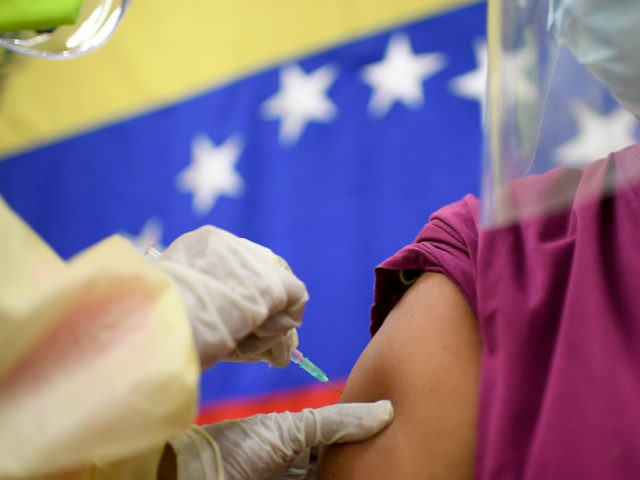The socialist regime of Venezuela announced this weekend it had obtained 500,000 doses of “Sputnik V,” a Russian coronavirus vaccine candidate, and began distributing the doses to those registered in the nation’s “Fatherland Card” system first.
The “Fatherland Card” is a government identification system that, according to Reuters, dictator Nicolás Maduro paid Chinese telecommunications company ZTE $70 million to build. Venezuelans must use it to access certain government aid programs, including often-necessary food, fuel, and medical purchases. In addition to tracking citizens’ purchases and economic behavior, the “Fatherland Card” documents their known political stances and activity, creating a detailed record of their identity.
Experts have compared its use to China’s “social credit system,” which assigns every Chinese citizen a numerical score based on how much the Communist Party believes it can trust them. Chinese citizens with low “social credit” scores cannot access basic government services and may find themselves banned from public transit, trains, and flights. In 2019, the last time Beijing publicly detailed the real-world effects of its system, the Communist Party had blacklisted at least 13 million from travel because of low “social credit” scores.
Maduro announced the arrival of 500,000 doses of “Sputnik V” during a nationally televised broadcast on Sunday, promising another five million doses arriving by July. He credited Covax, the international vaccine program run through the World Health Organization (W.H.O.), for the doses. Maduro also reportedly stated he was seeking vaccines manufactured by the American company Johnson & Johnson – despite claims in the past that the United States had descended into “chaos” over its poor handling of the pandemic – and a new product by Russia’s Gamaleya Institute, known as “Sputnik Light,” a one-dose version of Sputnik V.
Venezuela’s El Nacional reported that the vaccine rollout began in a disorganized fashion on Sunday, attracting large crowds of elderly citizens to a small number of vaccination sites. Maduro announced that the nation’s senior citizens – defined as those older than 60 – who possessed the “Fatherland Card” would take priority over other citizens to receive the doses that arrived that day. Members of the repressive Bolivarian National Guard (GNB), believed responsible for the killing and torturing of thousands of children under Maduro, reportedly policed vaccination points in Caracas to ensure preferred citizens received shots first.
Venezuelans who do not possess a “Fatherland Card” must first register on the Ministry of Health’s website for an appointment to receive a vaccine dose, a significantly delayed process compared to those registered in the surveillance system. At press time, access to the official site remains slow even on high-speed Internet in the United States. In Venezuela, most citizens struggle with prolonged power outages and one of the world’s worst-performing telecommunications services:
#30May #Coronavirus #Venezuela@Gbastidas: GNB custodia la entrada del hotel Alba Caracas, mientras los ciudadanos -la mayoría adultos mayores- esperan para vacunarse.
Dividieron dos filas: los convocados por el carnet de la patria (que tienen prioridad) y los no convocados. pic.twitter.com/mbP8X7FMW4
— Reporte Ya (@ReporteYa) May 30, 2021
Members of the nation’s frayed opposition condemned the use of the “Fatherland Card,” accusing Maduro of prioritizing the lives of socialists over those who chose not to openly support the regime. Lawmaker Delsa Solórzano shared reports on Sunday of regime officials not simply prioritizing those registered in the system, but ensuring that their most loyal supporters receive Sputnik V doses first by texting them through the system. Those the government calls to vaccination sites first take priority regardless of health status or potential vulnerability to the virus.
Maduro first introduced the concept of a ration card – common to most communist regimes – in 2014, claiming it necessary to prevent the major food and basic good shortages that followed nearly immediately after its implementation. The socialist regime replaced its first rudimentary system with the “Fatherland Card” in 2018. Rather than simply granting citizens access to supermarkets and gasoline stations, the “Fatherland Card” extensively documents personal information on every user, including “birthdays, family information, employment and income, property owned, medical history, state benefits received, presence on social media, membership of a political party and whether a person voted.”
Reuters revealed in 2018 that Maduro paid ZTE, a Chinese company with close ties to the Communist Party, $70 million to build the system. Maduro has yet to openly confirm ZTE, or Beijing’s, involvement, but his regime has referred to the program as a matter of “national security,” not merely economics. That same year, national security experts accused ZTE of implementing experimental technology used in the ongoing genocide of the Uyghur people in Xinjiang, China, on Venezuelans.
“Some of the new tech that the Chinese authorities are trying out on Uyghur Muslims is later applied more broadly in China and then exported abroad,” Sigal Samuel, a religion editor at the Atlantic revealed during an event at the Cato Institute in 2018.
The Maduro regime maintains close ties to the Chinese Communist Party; Beijing is one of the regime’s biggest funders. Experts estimate that Venezuela may be as much as $20 billion in debt to China, a debt it has partially paid off in crude oil. China and the socialist Venezuela regime support each other vocally on the international stage, as well. Among the most prominent examples is the Maduro regime using its position at the U.N. Human Rights Council to support China’s genocide campaign against the Uyghurs.
“The Chinese are very involved [in Venezuela],” Sen. Marco Rubio (R-FL) told Breitbart News in 2019. “[T]hey are single-handedly helping conduct the Internet control operation. They have basically taken a commercial version of their great Internet firewall and given it to Maduro, and it is a service they are providing him, so they are the ones that are shutting down the Internet and access to social media.”

COMMENTS
Please let us know if you're having issues with commenting.